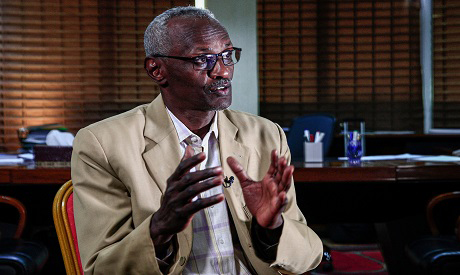
Sudan's water and irrigation minister Yasser Abbas gives an interview with AFP at his office in the capital Khartoum on February 6, 2021. AFP
Sudanese Irrigation Minister Yasser Abbas said in an interview on Monday that it would be possible to reach a legally binding agreement with Ethiopia on the Grand Ethiopian Renaissance Dam (GERD) before the second filling in July if Addis Ababa had the “political will.”
In an interview with Al-Sharq Al-Awsat newspaper, Abbas said that 90 percent of the terms have been agreed upon throughout the talks.
“Three legal points and four technical points remain unsettled. Altogether, they amount to no more than 10 percent, but are considered important and demand political will,” he said, adding that he expects an agreement can be reached within a day or two after resolving these key points.
“The time left before the second filling is sufficient to sign an agreement, because there is not much left to negotiate. We just need the political will for it,” he said.
Minister Abbas said that the three points involve the filling of the dam’s reservoir, the operation of the dam, and ensuring the equitable distribution of the Nile’s water.
“Sudan has proposed granting Ethiopia the full right to the unlimited use of Blue Nile waters for irrigation, electricity and potable water if it abides by international law that guarantees the equitable distribution of resources,” he stated
The remaining unsolved technical issues are not difficult to sort out if a binding agreement is first produced for the unresolved legal points, the Sudanese minister said.
When asked about the proposal on the exchange of data, which Ethiopia presented to Egypt and Sudan on Saturday, Minister Yasser Abbas described the proposal as “suspicious” and likely an attempt to buy more time.
Earlier this week, Ethiopia invited both Egypt and Sudan to nominate focal persons/dam operators to exchange data among the three countries with regards to the second-year filling, which will take place in July and August 2021.
Both countries rejected the proposal.
According to the Sudanese official, Sudan rejects the proposal because it only covers naming operators for following up on the testing of the dam’s lower gates.
“The proposal does not include sharing important data like the GERD’s filling dates and details and safety documents that we need to maintain safety at the Roseires dam,” he added, stressing the need for sharing vital information under a binding legal agreement that will ensure the sustainability and continuity of data exchange.
Abbas also denied that Ethiopia offered Sudan a special proposal that excluded Egypt.
Concerning the alternatives for Sudan if Ethiopia refuses to sign a binding legal agreement before the second filling, Abbas said that for Sudan, all legal diplomatic alternatives are on the table, at the top of which is resorting to the UN Security Council.
Last Wednesday, Abbas accused Ethiopia of stalling until the second filling of the GERD, stressing that moving forward with the second filling without a prior agreement "directly threatens Sudan and endangers the lives of 20 million citizens."
Meanwhile, Ethiopia’s Ministry of Foreign Affairs said in a statement on Monday that all of Sudan's concerns regarding the filling process and the safety of GERD have been resolved and addressed technically, expressing bewilderment as to why the downstream country has rejected Addis Ababa's latest proposal about the dam.
“Ethiopia has addressed all of the concerns of Sudan on the GERD as they're technical. Data exchange has been offered and dam safety is an issue that's well taken care of by Ethiopia for its own safety in the first place. Who profits by Sudan's rejection of the filling of the GERD?” the statement said.
The Ethiopian foreign ministry expressed "bewilderment" that for many years Sudanese officials lauded the GERD’s importance to deter flooding, regulate water flow for irrigation, remove a huge chunk of silt and sedimentation, and provide cheap energy.
“How will the interest of Sudanese people be served by rejecting the filling of the dam?” the statement said.
The Ethiopian foreign ministry also claimed that Egypt failed to recognize Addis Ababa's "generosity" in the talks.
“There is no experience to compare with Ethiopia, who invited its downstream [neighbours] to negotiate on its own hydro-electric generating dam on a river that originates from its lands.
Egypt failed to recognise Ethiopia’s generosity and understandings to negotiate in good faith,” the statement said.
Short link: